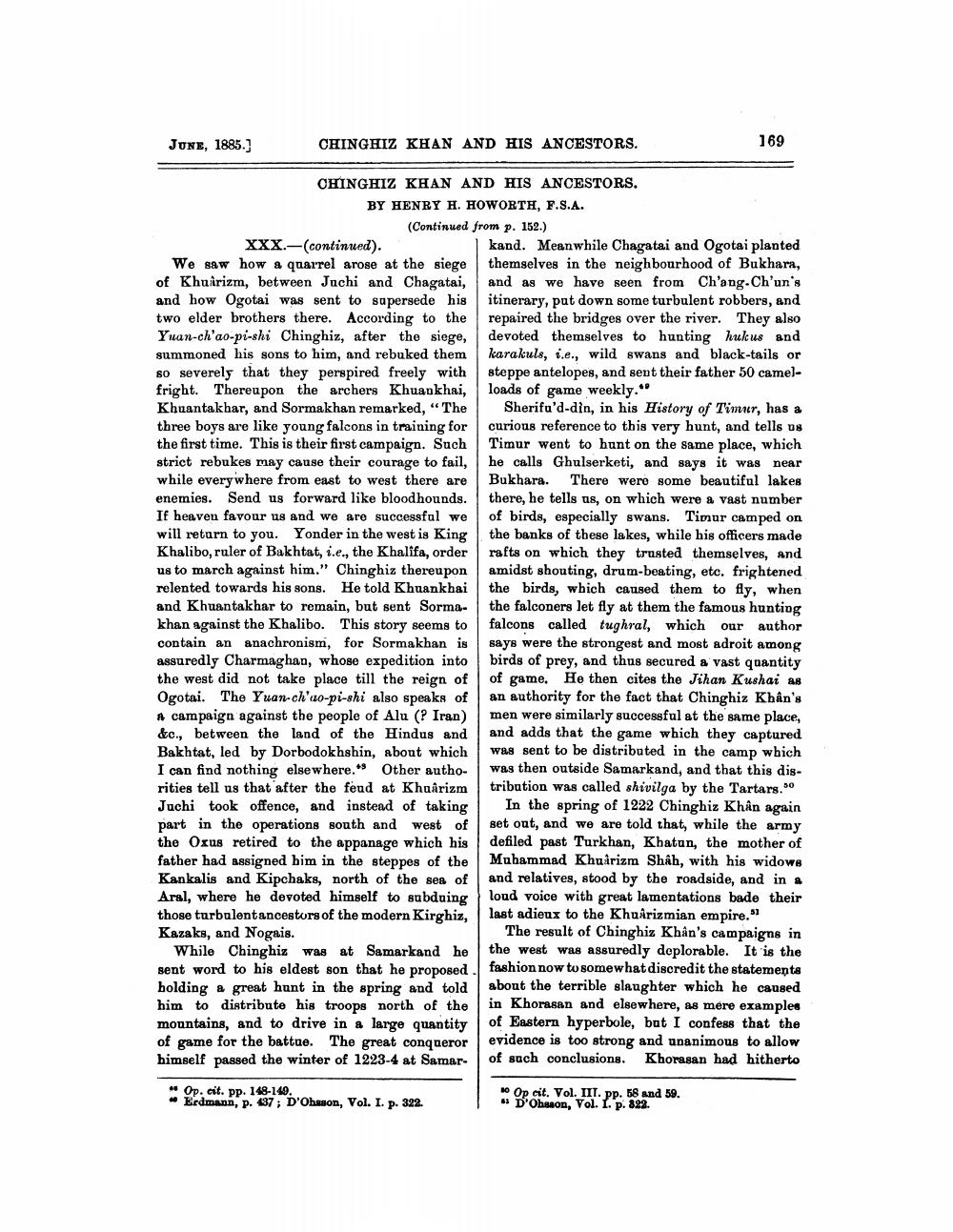________________
JUNE, 1885.)
CHINGHIZ KHAN AND HIS ANCESTORS.
169
CHINGHIZ KHAN AND HIS ANCESTORS. BY HENRY H. HOWORTH, F.S.A.
(Continued from p. 152.) Xxx.-(continued).
kand. Meanwhile Chagatai and Ogotai planted We saw how a quarrel arose at the siege themselves in the neighbourhood of Bukhara, of Khuarizm, between Jachi and Chagatai, and as we have seen from Chiang. Ch'un's and how Ogotai was sent to sapersede his itinerary, put down some turbulent robbers, and two elder brothers there. According to the repaired the bridges over the river. They also Yuan-ch'ao-pi-shi Chinghiz, after the siege, devoted themselves to hunting hukus and summoned his sons to him, and rebuked them karakuls, i.e., wild swans and black-tails or so severely that they perspired freely with steppe antelopes, and sent their father 50 camelfright. Thereupon the archers Khuankhai, loads of game weekly." Khuantakhar, and Sormakhan remarked, "The Sherifu'd-din, in his History of Timur, has a three boys are like young falcons in training for curious reference to this very hunt, and tells us the first time. This is their first campaign. Such Timur went to hunt on the same place, which strict rebukes may cause their courage to fail, he calls Ghulserketi, and says it was near while everywhere from east to west there are Bukhara. There were some beautiful lakes enemies. Send us forward like bloodhounds. there, he tells us, on which were a vast number If heaven favour us and we are successful we of birds, especially swans. Timur camped on will return to you. Yonder in the west is King the banks of these lakes, while his officers made Khalibo, ruler of Bakhtat, i.e., the Khalifa, order rafts on which they trusted themselves, and us to march against him." Chinghiz thereupon amidst shouting, drum beating, etc. frightened relented towards his sons. He told Khuankhai the birds, which caused them to fly, when and Khuantakhar to remain, but sent Sorma- the falconers let fly at them the famous hunting khan against the Khalibo. This story seems to falcons called tughral, which our author contain an anachronism, for Sormakhan is says were the strongest and most adroit among assuredly Charmaghan, whose expedition into birds of prey, and thus secured a vast quantity the west did not take place till the reign of of game. He then cites the Jihan Kushai as Ogotai. The Yuan-ch'ao-pi-shi also speaks of an authority for the fact that Chinghiz Khan's A campaign against the people of Alu (P Iran) men were similarly successful at the same place, &c., between the land of the Hindus and and adds that the game which they captured Bakhtat, led by Dorbodokhshin, about which was sent to be distributed in the camp which I can find nothing elsewhere." Other autho- was then outside Samarkand, and that this disrities tell us that after the feud at Khuárizm tribution was called shivilga by the Tartars. Juchi took offence, and instead of taking In the spring of 1222 Chinghiz Khân again part in the operations south and west of set out, and we are told that, while the army the Oxus retired to the appanage which his defiled past Turkhan, Khatun, the mother of father had assigned bim in the steppes of the Muhammad Khairizm Shâh, with his widowe Kankalis and Kipchaks, north of the sea of and relatives, stood by the roadside, and in a Aral, where he devoted himself to subduing loud voice with great lamentations bade their those turbulentancestors of the modern Kirghiz, last adieux to the Khuårizmian empire." Kazaks, and Nogais.
The result of Chinghiz Khan's campaigns in While Chinghiz was at Samarkand he the west was assuredly deplorable. It is the sent word to his eldest son that he proposed. fashion now to somewhat discredit the statements holding a great hunt in the spring and told about the terrible slaughter which he caused him to distribute his troops north of the in Khorasan and elsewhere, as mere examples mountains, and to drive in a large quantity of Eastern hyperbole, but I confess that the of game for the battue. The great conqueror evidence is too strong and unanimous to allow himself passed the winter of 1223-4 at Samar- of such conclusions. Khorasan had hitherto
* Op. cit. pp. 148-149. · Erdmann, p. 437; D'Ohason, Vol. I. p. 322.
10 Op cit. Vol. III. pp. 58 and 59.
D'Obson, Vol. 1. p. 822.




